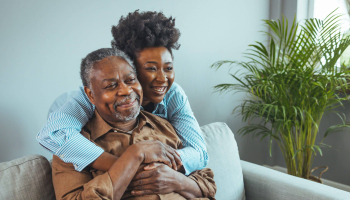
I remember back in 2016 when a friend’s father was informed that he had throat cancer.
The news were shocking to everyone in the village. The family was engulfed by anticipatory grief as they started wondering what these tidings would mean to the family since the old man was the sole breadwinner and patriarch of the family.
Cancer cases had become rampant in the village. And they never ended well. At most times, they ended with the person spending so much money on medical costs and eventually dying. The families were left with a huge loss plus the big debts left as the person was seeking medical support.
The throat cancer diagnosis had a big effect on the old man. He refused to be consoled. He lacked motivation to keep pushing on in life. Suddenly, a man who was hitherto very social became the complete opposite. He did not want to talk to people, leave alone his family members. It was devastating for everyone seeing what was happening.
He believed that he was dying. A diagnosis of cancer was like a death sentence. It meant just one thing: a slow painful death with no cure whatsoever.
We were only saved by a doctor who later informed this old man that his cancer was in the early stages. It could easily be remedied through chemotherapy. Suddenly, he changed again. He had a newfound relish for life and brisked through his daily activities.
It was a miracle.
Impact of terminal illness on family
When news of a terminal illness hit a family, they are suddenly engulfed by an untold fear. They may moan about what is happening. At other times, they might just go mum as they process what the news mean. This is called anticipatory grief.
The family might suddenly want to spend lots of time with the terminally ill patients because they do not know when death might just happen.
Others might want to ask for forgiveness from the patient since any day, they might be gone for good.
How to help family of dying person
To help families that have a dying person in their hands, do the following:
- Counsel them on the inevitability of death
- Ask them to give moral support to the dying person
- Help them in their financial challenges
- Advise them on legal undertakings that need to be done such as having the dying person write a will.
Terminal illness preparing for death
Reflecting in the face of adversity can have an amazing therapeutic effect. It can make you more present in your current moments, provide a space for self-inquiry that may not be working elsewhere, and give you healing energy to move forward productively now. Reflecting on death means reflecting on what made your life worth living; what gave it meaning? What did you love doing?
What was the best experience of your lifetime? Where were these experiences possible, where would they no longer be available to you if given a terminal diagnosis or time constraint?
How to help a dying person
As much as giving emotional support to the family of dying is important, it is also good to know that the dying too should be accorded lots of moral support as they face a very difficult time. As they die, some people are in denial and tend to be socially aloof. They may lack the motivation to do anything since they suffer from a condition called psychogenic death where they tend to give up on their lives. You can support them through the following ways:
- Counselling to patient on the inevitability of death—eldery people as they near death need to be given professional counselling so that they can face death boldly knowing that it is inevitable for everyone.
- Write a will—it is good that as they die, elderly people are allowed to write a will so that their property is shared as per their wishes. At our hospice, we work to make sure that legal counsel is granted to the dying so that they can craft good wills on how their property is going to be divided among the family members
- Have their last wishes—when you notice that someone is in their sunset years, it is good to have them communicate on any wishes they would like granted. You can then work hard to have those wishes done so that the person can die peacefeully feeling that they have accomplished. Some of the elderly people who die at our hospice wish to have a last meal with all the family members and we work hard to grant them this last wish.
- Funeral arrangements—when dying most people want to be prepared in terms of knowing where they are going to be buried, who will bury them as well as how the funeral program will be conducted. Some people want their bodies to be interred in a crematorium while others want their bodies given out to colleges as cadavers for research on human anatomy. If you find that you patient is in their end of life stages, it is good to talk with them so as to know what their wishes are as far as funeral arrangements are concerned.
- Assure them that they are loved—even though they do not want to be talked to, they need to hear that you love them and that you will miss them once they die. Assure them that you will be with them throughout the journey.
- Offer them spiritual support—the dying person might want to see their pastor or religious leader for the last prayers. Some might want to be baptized in case they are Christians so that they can be assured of a life after death.








